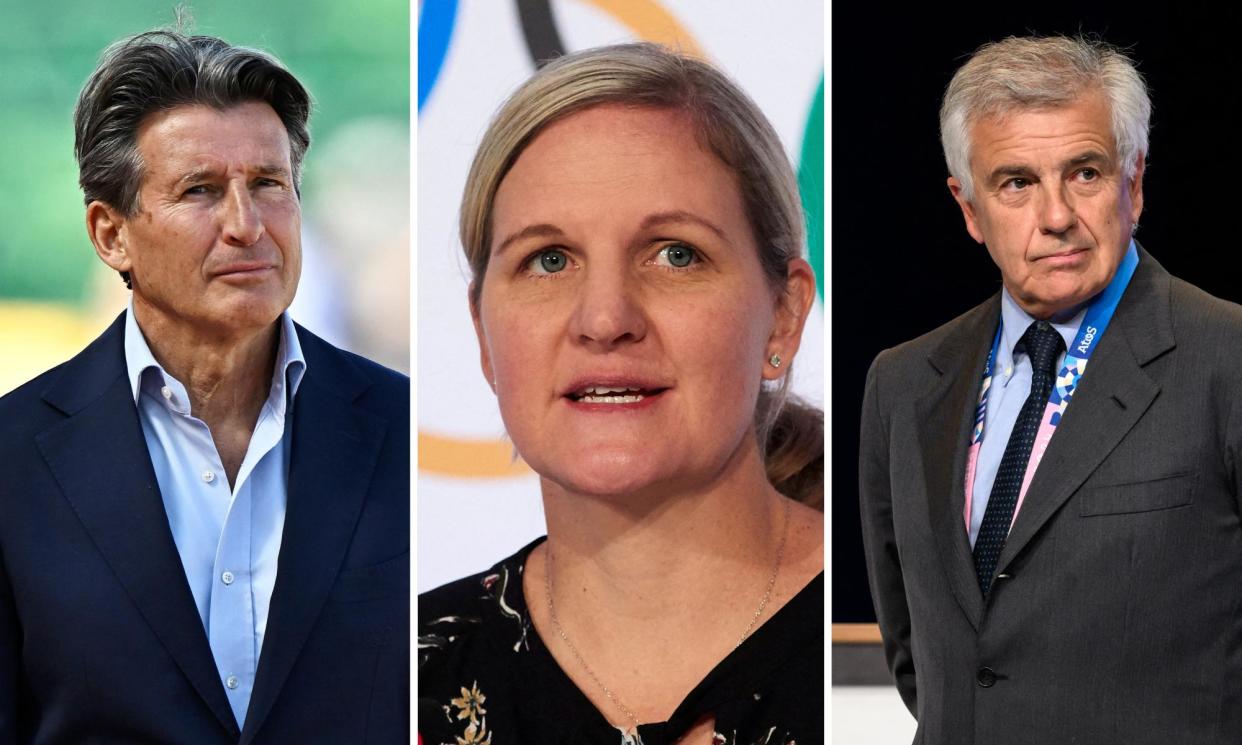‘Laser-like focus’: Coe makes pitch for IOC presidency against tough field

Sebastian Coe has launched his bid to be the next president of the International Olympic Committee by stressing his experience and expertise, and by telling voters: “Olympic sport is fundamental to my DNA.”
Coe, who is World Athletics president, is one of seven candidates for the biggest job in global sports politics. No Briton has held the presidency since the IOC was formed in 1894.
Related: Sebastian Coe faces a fight to become IOC president – but write him off at your peril | Sean Ingle
But Coe, whose CV also includes being a double Olympic gold medallist and running the London 2012 Games, will face a tough challenge from a field that includes a Jordanian prince, a seven-time Olympian, and the well-connected son of a former IOC president. The global leaders of cycling, gymnastics and skiing have also put their names forward for the job of replacing Thomas Bach when he steps down next year.
Like most major sporting organisations, the IOC faces a number of challenges, including needing to renegotiate multimillion-dollar TV deals in a rapidly changing media landscape, find new sponsors, and find ways to stay relevant with younger viewers.
In a statement, Coe outlined the qualities he believes can attract a majority of the IOC’s 111 members to vote for him next March. “Olympic sport is fundamental to my DNA,” he wrote. “I had the privilege of being a double Olympic Champion, I’ve chaired an Olympic and Paralympic Games – London 2012 – from bid, through delivery and legacy implementation, I’ve chaired a National Olympic Committee – the BOA – and I’ve led an international federation through some turbulent times, retaining athletics’ position as a cornerstone of the Olympic Games.”
Coe also promised to invest more into sports organisations and to help people get fitter. “Sport plays a critical role in driving and maintaining the health and fitness of people, young and old, in every country around the world. But it faces significant challenges on multiple fronts,” he wrote. “The Covid years saw many people struggle through inactivity and many sports organisations suffer through lack of funds. We need to invest more in both over the next decade. A laser-like focus on sport must be the priority for the IOC. I believe I can help achieve this and more.”
There had been suggestions that the 67-year-old Coe could be too old for the top job under the IOC’s opaque rules which require some members to step down at 70. However on Monday the IOC confirmed that was not the case and he could apply for a four-year age extension in 2026. But while Coe is one of the favourites, his path to the top job has been made harder having fallen out with Bach over the decision of World Athletics to ban Russia for state-sponsored doping. Bach is expected to throw his weight behind Kirsty Coventry, the former Zimbabwean swimmer who is bidding to become the first woman to become IOC president.
A bigger challenge still could come from the Spaniard Juan Antonio Samaranch, the IOC’s well-connected and respected vice-president, whose father was president from 1982 to 2001. In a statement, Samaranch insisted that his candidacy was “built on a commitment to continue the legacy” of Bach in a time of uncertainty and change.
“The IOC and Olympic movement have made enormous strides over the past decade under the leadership of Mr Bach. The IOC now needs a new leader with deep experience of the Olympic movement who can help steer it through this period of upheaval.”
David Lappartient, president of cycling’s governing body, Morinari Watanabe, who heads gymnastics, and Johan Eliasch, president of the International Ski and Snowboard Federation, are also standing. As part of the election all candidates are required to make a presentation to the full IOC membership in Lausanne in January 2025. The vote will then take place at the 143rd IOC session from 18-21 March 2025 in Greece.


